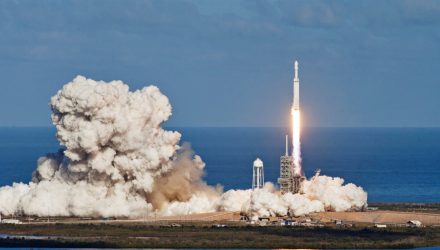Amid all the doom and gloom surrounding the pandemic as well as protests across the nation, there was a bright spot this past weekend—private company SpaceX partnering with NASA to send two astronauts into space. This will help open up opportunities for exchange-traded funds (ETFs) that focus on the space industry.
“Elon Musk’s private space company on Saturday launched NASA astronauts Bob Behnken and Doug Hurley into orbit, successfully beginning SpaceX’s first crewed mission. The company’s Falcon 9 rocket and Crew Dragon spacecraft took off from NASA’s Kennedy Space Center in Florida at 3:22 p.m. ET. The capsule is the first privately designed and built spacecraft to carry astronauts to space and is bound for the International Space Station,” a CNBC report explained. “Beyond the achievement for SpaceX, the launch represents the first time NASA has launched its own astronauts since the end of the space shuttle program nearly a decade ago.”
“It was incredible,” NASA astronaut Bob Behnken said of the launch, moments after the spacecraft reached orbit. “Appreciate all the hard work and thanks for the great ride to space.”
This is certainly something that can help fuel the Procure Space ETF (NYSEArca: UFO) to future gains. In an exchange-traded fund (ETF) landscape that has over 2,000 funds for investors to choose from, it’s important to have product differentiation in this quest for assets under management like UFO–the world’s first global ETF to give investors pure-play access to the expanding space industry.
The UFO ETF tracks the S-Network Space Index, which focuses on companies that are significantly engaged in space-related activities. Index constituents span multiple industries, including satellite-based consumer products and services, rocket and satellite manufacturing, space technology hardware, and space-based imagery and intelligence services.
Approximately 80 percent of companies in the index derive the majority of revenues directly from their involvement in the space industry, enabling investors to potentially capture this growing segment of the global economy. The Commerce Department is already throwing its support behind the American space industry with ambitious goals for regulatory reform and promotional efforts.
Another ETF to check out is the SPDR Kensho Final Frontiers ETF (ROKT), which seeks to provide investment results that, before fees and expenses, correspond generally to the total return performance of the S&P Kensho Final Frontiers Index. The index is designed to capture companies whose products and services are driving the innovation behind the exploration of deep space and deep sea.
For more market trends, visit ETF Trends.








